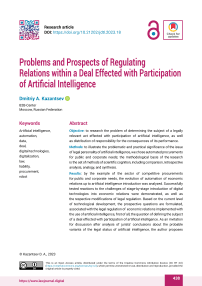Problems and Prospects of Regulating Relations within a Deal Effected with Participation of Artificial Intelligence
Автор: Kazantsev D. A.
Журнал: Journal of Digital Technologies and Law @lawjournal-digital
Статья в выпуске: 1 (2), 2023 года.
Бесплатный доступ
Objective: to research the problem of determining the subject of a legally relevant act effected with participation of artificial intelligence, as well as distribution of responsibility for the consequences of its performance. Methods: to illustrate the problematic and practical significance of the issue of legal personality of artificial intelligence, we chose automated procurements for public and corporate needs; the methodological basis of the research is the set of methods of scientific cognition, including comparison, retrospective analysis, analogy, and synthesis. Results: by the example of the sector of competitive procurements for public and corporate needs, the evolution of automation of economic relations up to artificial intelligence introduction was analyzed. Successfully tested reactions to the challenges of stage-by-stage introduction of digital technologies into economic relations were demonstrated, as well as the respective modifications of legal regulation. Based on the current level of technological development, the prospective questions are formulated, associated with the legal regulation of economic relations implemented with the use of artificial intelligence, first of all, the question of defining the subject of a deal effected with participation of artificial intelligence. As an invitation for discussion after analysis of jurists’ conclusions about the probable variants of the legal status of artificial intelligence, the author proposes variants of answers to the question of its legal personality when effecting a deal. To solve the issue of responsibility for the decisions resulting from the implementation of algorithms of a software and hardware package, we propose several models of distributing such responsibility among its creator, owner, and other persons, whose actions might influence the results of such an algorithm functioning. The proposed conclusions may be used to develop normative regulation both as a set and individually. Scientific novelty: based on the analysis of evolution of the practices of using digital technologies in procurement, the work formulates potential legal problems, determined by the constant automation of economic relations, and proposes legal constructs to solve such problems. Practical significance: the conclusions and proposals of this work are of prospective significance for conceptual comprehension and normative regulation of electronic procurement tools both at corporate and national level.
Artificial intelligence, automation, data, deal, digital technologies, digitalization, law, liability, procurement, robot
Короткий адрес: https://sciup.org/14127031
IDR: 14127031 | DOI: 10.21202/jdtl.2023.18


